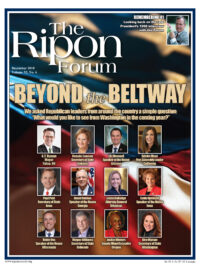
Like most Republicans, my expectations for the federal government over the next two years were significantly lowered when it became clear on election night that Democrats had taken control of the House of Representatives. The prospect of Congress passing meaningful legislation that will positively impact states on issues like regulatory reform, energy policy, or further improvements to the tax code seem unlikely with a divided government. However, there is still much the federal government can do (and not do) to empower state governments.
The federal government sets the tone for political discourse in our country, and there is a lot that can be done to improve civility. There are major disagreements between the political parties, and even within them. However, political opponents aren’t enemies, and elected officials in both parties need to do a better job of communicating that to voters. The parties have very different visions of how to improve our country, but we often lose sight of the fact that we all love our country and are fighting to make it better. In this country we settle disagreements with debate and ballots, not with armies and edicts. The same cannot be said in all parts of the world, and for that, we should all be extremely grateful.
Political opponents aren’t enemies, and elected officials in both parties need to do a better job of communicating that to voters.
It was certainly disappointing for Republicans to lose control of the House of Representatives, making it much more difficult to implement sound policy and fiscal restraint. However, for those of us that believe in limited government, there is a silver lining to divided government. Sharing control of Congress tends to produce gridlock, and neither party will have an opportunity to pass the kind of sweeping legislation that tends to bust budgets and force unfunded mandates onto state governments. Don’t get me wrong, I would much rather see Republicans control both chambers of Congress – but at a time when our federal government continues to expand and the national debt continues to grow, there can be virtue in gridlock.
It’s my hope that out of this gridlock, the federal government finds a renewed sense of federalism. If divided government paralyzes Congress to address a problem, states governments are more than capable of stepping in and offering solutions that best fit their residents. That’s what our Founders intended. For instance, the federal government owns over 40% of the land in Arizona, and I’m confident that Arizonans would do a much better job of managing some of that land.
While expectations for the next Congress are low, taxpayers do have some cause for optimism.
There’s also direct action that states can take to rein in runaway federal spending. Last year, Arizona hosted a planning session with over 20 other states for an Article V convention to add a balanced budget amendment to the U.S. Constitution and give states a greater voice when it comes to the national debt. There’s still much work to do in order to make such an amendment a reality, but with each taxpayer’s share of the national debt at over $178,000 and growing, I believe a balanced budget amendment is a necessary eventuality.
While expectations for the next Congress are low, taxpayers do have some cause for optimism. The federal government may be plagued by gridlock and discord, but state governments will continue to balance budgets, solve problems, and create opportunities.
J.D. Mesnard is the Speaker of the Arizona House of Representatives.




